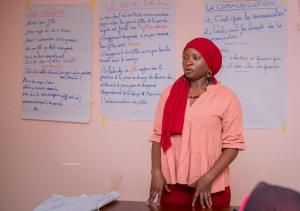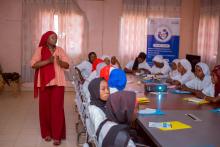Female genital mutilation in Senegal: a multi-pronged fight for lasting change
Dakar – Awa has never forgotten the day of her circumcision, at just nine years of age. « They cut me with a knife, without anaesthetic, with just a piece of cloth in my mouth to muffle my screams," she recalls.
Now, aged 25 and living in Kolda in the south of Senegal, Awa has become an activist against female genital mutilation (FGM), any procedure involving the partial or total removal of a woman's external genitalia, or any other injury to the female genital organs that is performed for non-medical reasons.
In Senegal, nearly two million girls and women have undergone FGM, according to the most recent figures in the Demographic Health Survey (DHS) 2019. Most circumcisions are performed on girls under the age of five, and rarely on girls older than 10. Senegal is one of 26 countries in the African Region where the practice is common.
Cognizant of the threat, the country is stepping up counter-measures. In 2022, the government adopted National Strategy for the Elimination of FGM (2022-2030). This complements the Penal Code, which has punished FGM since 1999.
Senegalese civil society is also playing an active role. The Adolescent Counselling Centre, a service for the promotion and management of issues relating to reproductive health, gender-based violence (GBV) and female genital mutilation among adolescents, was set up by the Senegalese government in Kolda in 2000.
Especially focused on psychological support for victims, the Centre assisted 96 women in 2023. These included cases of under-age pregnancy, gender-based violence and the impacts of FGM, as well as rape and abuse. A total of 80% of cases went to court, while the remainder were dealt with by psychologists and counsellors.
"Female genital mutilation has a major impact on the physical and psychological health of victims throughout their lives. Some victims die as a result of haemorrhages, infections or even psychological distress," explains Babacar Sy, Centre coordinator.
"FGM is traumatic for the victims, who have bitter memories of the experience, » he says, adding that the centre organizes community and intergenerational dialogues, examining the religious and medical arguments, to encourage people to abandon the practice.
Awa, the young activist, is one of the leaders of the girls’ club set up by the Centre. "One of the things I'm most proud of is that I was able to change my grandmother’s mindset – the woman who circumcised both my sister and me. Today, she has officially declared her abandonment of female genital mutilation," she reveals.
Through activities and campaigns highlighting the issue of female genital mutilation, the Centre has encouraged more than 3000 young girls to declare their opposition to FGM.
"Senegal has prioritized the fight against FGM, and this is reflected in all our actions to ensure that this practice, which has claimed too many innocent victims in our country, is ended," says Dr Ndoye Mamadou, coordinator of the programme to combat FGM in the country’s Ministry for Women, Family and Children.
In line with its role of protecting the health of populations, World Health Organization (WHO) in the African Region is supporting Senegal and other high-risk countries in this fight. WHO supports the development of policies and strategies, and produces evidence on the consequences of this scourge to encourage countries to end FGM. It also provides guidelines, advocacy tools and training manuals to inform health workers about the practice, and build their capacity to counter it.
"All health professionals in Senegal are likely to be confronted with an FGM-related complication at least once in their careers. That's why it is important that, in addition to information and communication activities, health workers are trained to provide proper care for victims," says Dr Jean Marie Vianny Yaméogo, WHO Representative in Senegal.
"Adequate treatment for FGM is fundamental to the physical, psychological and social well-being of the victims," he adds.
All those involved in the fight against FGM are working hard to put an end to the practice in the country. However, vigilance remains necessary as current trends suggest that Senegal may be off-track to meet the Sustainable Development Goal objective of eradicating FGM by 2030.
Support for existing initiatives and continuing to encourage vocations in this field, particularly among young girls, is therefore critical. "We girls are the mothers of tomorrow. So it's important that we get involved in informing our communities about the dangers of this practice," stresses Awa.
Chargée de Communication
OMS Sénégal
Email : sallai [at] who.int (sallai[at]who[dot]int)
Chargée de communication en appui aux pays francophones
Bureau régional Afrique de l’OMS
Email : asekpon [at] who.int (asekpon[at]who[dot]int)

